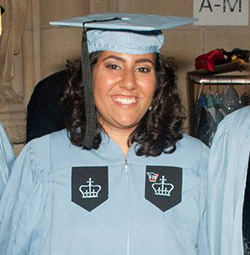Filed Under > Convocation
Joyce Rafla: Bridging Difference, Raising Employment, Through Education
Joyce Rafla: Bridging Difference, Raising Employment, Through Education
It wasn’t until early February 2011, when President Hosni Mubarek resigned after 18 days of intense protests, that the Internet was restored and Rafla was able to send her application to TC’s Master’s program in Cognitive Studies in Education. She was accepted on April 1. “I thought it was an April Fools’ joke,” she says. But the seriousness of the situation in Cairo had only intensified her desire to work in education. Like many of the well-educated Egyptian demonstrators who were frustrated because they could not work, Rafla sees education as an opportunity – and an implicit promise – for economic and social equity. That promise had been broken in Egypt by Mubarak’s tightly controlled, authoritarian regime, which had stifled economic progress and growth.
Yet becoming a teacher – even an excellent one – is not enough for Rafla. Believing that instruction must ultimately be personalized and that doing so requires “the best knowledge we have about how the brain and cognition work,” she says she came to TC to “learn how people learn” and, more specifically, to develop curricula and cognitive-guided instruction that taps into each learner’s capabilities at any stage of development. To that end, using the clinical interview method created by the psychologist Jean Piaget, Rafla has learned at TC how to look into children’s minds to discover not only what they think but how they think.
In the days and months following Mubarak’s defection, Rafla also came to understand that education must be tied to realistic employment prospects. She is working with colleagues on an education technology startup called T21.org, an instructional platform based on social networking to help make 15- to 29-year-olds more employable. She hopes the program, which is scheduled to launch in the coming months, can bridge the gap from research to practice to help address structural unemployment in Egypt and the Middle East. “There are jobs,” she says, “but people aren’t trained for them.”
Rafla also wants to study how education can bridge cultures. “Most of us grow up as mono-cultural people, believing there is only one right answer,” she says. “We grow up not knowing the ‘other.’ Education is such a powerful tool. Whether for economic development or broader cross-cultural understanding, it breaks down barriers and brings people together.”
Published Friday, Jun. 7, 2013
